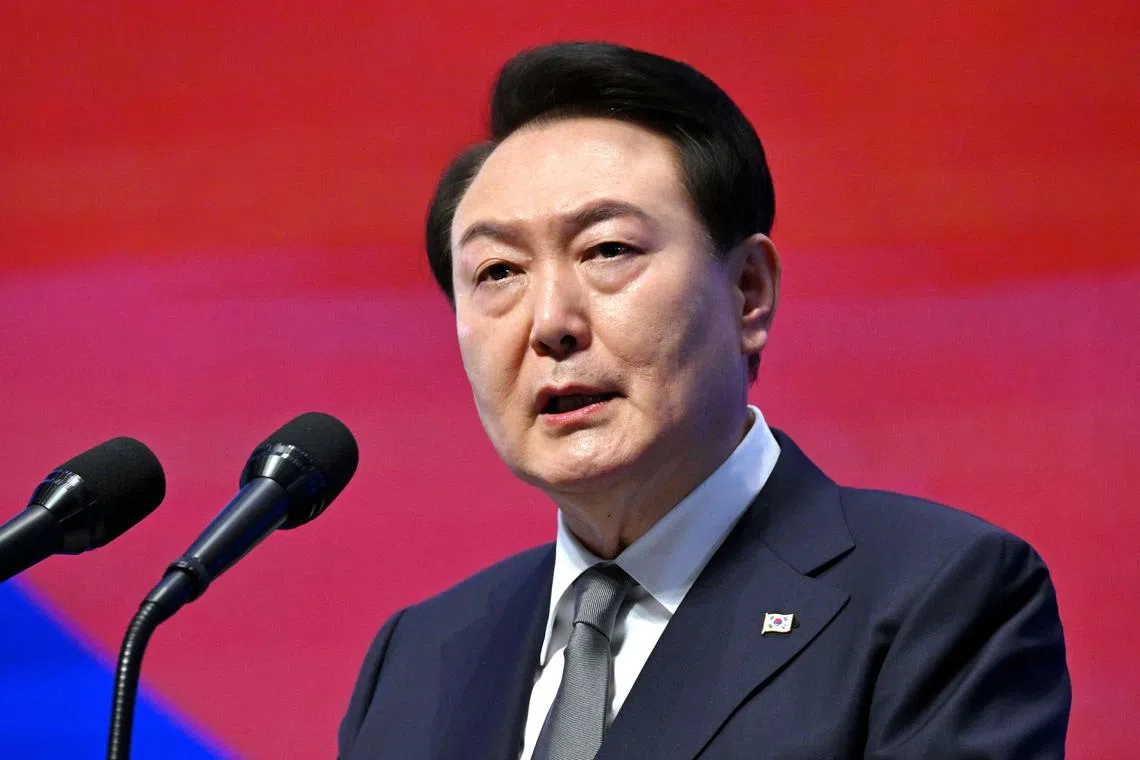South Korean President Faces Imminent Arrest Amidst Political Turmoil
South Korean authorities are moving forward with plans to arrest President yoon Suk Yeol by January 6th, following his controversial declaration of martial law. The move comes after lawmakers suspended President Yoon in December amid allegations of attempting to undermine civilian rule. The Corruption Examination Office (CIO) issued the arrest warrant after President Yoon repeatedly refused to cooperate with questioning.

The situation has escalated into a major political crisis,with supporters and opponents of the President staging large-scale demonstrations outside the presidential compound where he has remained holed up for weeks. The atmosphere is tense, with reports of clashes between protesters and law enforcement.
In a statement released late on January 1st and confirmed by his lawyer, Yoon Kab-keun, to AFP, President Yoon declared, “The Republic of Korea is currently in danger due to internal and external forces threatening its sovereignty and the activities of anti-state elements. I vow to fight alongside you to the very end to protect this nation.”
Lawmaker Jo Seoung-lae of the opposition Democratic Party sharply criticized President Yoon’s statement, calling it “highly inappropriate” and accusing him of inciting conflict. He described the President’s actions as “delusional.”
CIO chief Oh Dong-woon stated on January 1st that the arrest warrant will be executed by the January 6th deadline. ”We aim for a smooth process without major disturbances, but we are also coordinating to mobilize police and personnel in readiness,” he told reporters, adding that anyone obstructing the arrest could face prosecution.
President Yoon’s legal team has filed an injunction to block the warrant, claiming the arrest order is “an unlawful and invalid act.” Despite this, hundreds of loyal supporters have flocked to Seoul to demonstrate their support.
Staff Resignations Amidst Crisis
Adding to the unfolding drama, the majority of President Yoon’s remaining staff, including his chief of staff and special advisors, submitted their resignations on January 1st. Acting President choi sang-mok rejected these resignations, urging unity during this critical period. “this is a time for everyone to come together for the stability of the livelihood of the nation,” he stated.
President Yoon faces serious charges of insurrection, carrying potential penalties ranging from life imprisonment to the death penalty. The upcoming arrest and the ongoing political instability raise concerns about the future of South Korea’s government and its international relations. The situation bears watching for its potential impact on regional stability and global affairs.
South Korea’s political crisis Deepens Amid Impeachments and Martial Law Declaration
South Korea is grappling with an unprecedented political crisis following the impeachment of President Yoon Suk-yeol and his successor, Han Duck-soo, within a week.The turmoil began with Yoon’s impeachment, prompting acting President Choi Sang-mok to take office on December 27th. The situation escalated dramatically when yoon declared martial law in a surprise televised address, claiming it was necessary to quell “anti-state elements.” However, this move was swiftly rejected by Parliament.
The declaration of martial law was met with immediate resistance. Lawmakers raced to the National Assembly to vote against the measure. Simultaneously, a dramatic scene unfolded as heavily armed troops stormed the parliament building, breaching security barriers and causing significant damage. The images of troops scaling fences and helicopters landing near the building shocked the nation and the world.
Adding to the chaos, Choi’s appointment of two new judges to the Constitutional Court, which is hearing Yoon’s impeachment case, further inflamed tensions. While this move appeased the opposition, it was criticized by Yoon’s staff as an overreach of authority for an acting president. “This decision was made to ensure a fair and impartial hearing,focusing on the needs of the people and national affairs,” Choi stated.
The Constitutional Court is now tasked with the critical decision of upholding or rejecting Yoon’s impeachment. The outcome will have profound implications for South Korea’s political landscape. The crisis deepened further with the impeachment of Han Duck-soo, who faced accusations of failing to sign bills related to investigations into his predecessor’s actions.
Adding to the already dire situation, Choi’s brief tenure was immediately tested by a devastating tragedy. On December 29th, a jeju Air plane crash claimed 179 lives, placing immense pressure on the acting president’s management to manage the crisis effectively. The scale of the disaster further underscores the immense challenges facing South Korea during this period of intense political instability.
The events in South Korea have drawn international attention, highlighting the fragility of democratic institutions and the potential for rapid escalation during times of political upheaval. The situation serves as a stark reminder of the importance of stable leadership and the potential consequences of political polarization.
The unfolding events in South Korea raise concerns about the stability of the region and the potential impact on global affairs. The situation warrants close monitoring as the Constitutional Court deliberates on the impeachment cases and the nation navigates this period of profound uncertainty.
